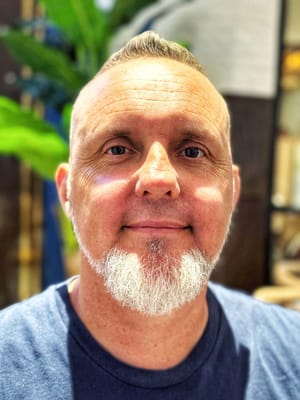When I first started exploring philosophy as more than just an intellectual exercise, I discovered something fascinating: the most powerful philosophical insights often come down to asking the right questions rather than finding perfect answers.
In my journey from homeless teenager to martial arts coach to philosophical guide, four questions have consistently helped me navigate life's challenges. They're not complex philosophical puzzles—they're practical tools for gaining clarity when life feels most confusing.
1. ‘What's Actually Within My Control?’
I first encountered this question through Stoic philosophy, but its practical power hit home during my recent health crisis. Facing what looked like a career-ending diagnosis, I found myself overwhelmed until I wrote down two lists:
Things I couldn't control:
- My cervical degeneration
- Past training decisions (CTE-like symptoms are here to stay)
- I can no longer practice martial arts as I once did
Things I could control:
- My response to the diagnosis
- How I chose to reinvent myself
- What wisdom I could share from this experience
This simple distinction changed everything. Instead of fighting reality, I could focus my energy on what I could actually influence. It's become my first step in any challenging situation.
2. ‘What Story Am I Telling Myself?’
This question emerged from my study of existential philosophy, particularly Sartre's ideas about how we create meaning. When I lost my identity as the martial artist I had been for most of my life, I caught myself telling a devastating story: "I'm worthless now. I've lost everything that made me who I am."
But was this true? Or was it just a story I was choosing to believe?
By questioning this narrative, I could begin crafting a different one: "I'm not just losing something—I'm being called to evolve into something new."
Try this: Next time you're struggling, write down the story you're telling yourself. Then ask: Is this the only possible interpretation? What other stories could be true?
3. ‘What Would This Look Like If It Were Easy?’
I borrowed this question from modern philosophy (via Tim Ferriss), but it reflects ancient wisdom about not unnecessarily complicating our lives. When I was reinventing my career, I initially created elaborate plans that felt overwhelming.
Then I asked: What would this look like if it were easy?
The answer was surprisingly simple: Start sharing what I've learned. Help others navigate their challenges using the philosophical tools that helped me. Begin with one conversation at a time.
This question cuts through our tendency to overcomplicate and reveals simpler paths forward.
4. ‘What Does My Natural Wisdom Say?’
This final question emerged from my research into mindfulness and nature-based therapy. We often have an innate sense of what's right for us, but we override it with shoulds and musts.
When I sit quietly and ask this question, the answer often comes not in words but in a felt sense—a physical knowing of what's true. It's like the body knows what the mind is still figuring out.
This question has become central to my Natural Wisdom praxis, helping clients reconnect with their own inner guidance system.
Putting the Questions to Work
These questions aren't meant to be abstract philosophical exercises—they're practical tools for daily life. Here's how to use them:
- Write them down somewhere visible
- Choose one question to focus on each week
- Use them as journal prompts
- Apply them to both small decisions and major life choices
The power isn't in finding perfect answers but in creating space for deeper wisdom to emerge.
An Invitation to Practice
This week, I invite you to experiment with these questions in your own life. Pick one that resonates and apply it to a current challenge. Notice what shifts.
Share your experiences in the comments—what questions have guided you through difficult times?
What insights emerged when you asked them?
Because sometimes the questions we ask matter more than the answers we find.










Member discussion